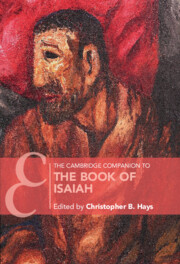Book contents
- The Cambridge Companion to the Book of Isaiah
- Frontispiece
- Cambridge Companions to Religion
- The Cambridge Companion to the Book of Isaiah
- Copyright page
- Contents
- Notes on Contributors
- Acknowledgments
- Timeline of Events Related to the Book of Isaiah
- Abbreviations
- Maps
- 1 Introduction
- Part I The Book of Isaiah Through History
- Part II Isaiah in Its Cultural World
- Part III Isaiah as Literature
- 12 Isaiah as Poetry
- 13 Isaiah in Intertextual Perspective
- 14 Gendered Imagery in Isaiah
- 15 Divine and Human Plans in the Book of Isaiah
- Part IV Afterlives of the Book of Isaiah
- Scripture Index
- Other Texts Index
- Subject Index
- Cambridge Companions to Religion ()
- References
15 - Divine and Human Plans in the Book of Isaiah
from Part III - Isaiah as Literature
Published online by Cambridge University Press: 08 November 2024
- The Cambridge Companion to the Book of Isaiah
- Frontispiece
- Cambridge Companions to Religion
- The Cambridge Companion to the Book of Isaiah
- Copyright page
- Contents
- Notes on Contributors
- Acknowledgments
- Timeline of Events Related to the Book of Isaiah
- Abbreviations
- Maps
- 1 Introduction
- Part I The Book of Isaiah Through History
- Part II Isaiah in Its Cultural World
- Part III Isaiah as Literature
- 12 Isaiah as Poetry
- 13 Isaiah in Intertextual Perspective
- 14 Gendered Imagery in Isaiah
- 15 Divine and Human Plans in the Book of Isaiah
- Part IV Afterlives of the Book of Isaiah
- Scripture Index
- Other Texts Index
- Subject Index
- Cambridge Companions to Religion ()
- References
Summary
In “Divine and Human Plans of God in the Book of Isaiah,” J. Todd Hibbard follows the occurrences of a Hebrew root that means “to plan, advise, counsel” through the whole book, bringing to light one of its central themes. He shows how Isaiah’s theological rhetoric begins with a plan against Judah that involves foreign nations, but eventually undermines the plans of those nations as well. As with feminine imagery in the book, it is possible to identify a kind of episodic narrative running through the book in relation to certain themes in a way that animates the development of the book and holds it together despite its lengthy formation. The divine plans for Judah and nations eventually come together and culminate with the summoning of Cyrus as messiah and the appearance of the Persian empire.
- Type
- Chapter
- Information
- The Cambridge Companion to the Book of Isaiah , pp. 243 - 258Publisher: Cambridge University PressPrint publication year: 2024

